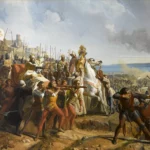Let’s embark on a journey through time to uncover the captivating story of the Judeans, a people whose legacy has profoundly shaped history and culture as we know it.
From Humble Tribe to Powerful Kingdom
Our story begins in the sun-drenched hills and fertile valleys of the Southern Levant, in a mountainous territory known as Judea. It was here that the Judeans, tracing their lineage back to the tribe of Judah, established their ancient kingdom. With Jerusalem as its majestic capital, the Kingdom of Judah became a powerful symbol of Jewish identity, resilience, and independent rule.
Deeply rooted in the beliefs of their ancestors, the ancient Israelites, the Judeans held steadfast to the revolutionary idea of one God. This belief system would eventually evolve into the Judaism we know today. Their kingdom, ruled by descendants of the legendary King David, flourished for centuries, leaving behind a legacy of faith, resilience, and cultural heritage.
[https://www.lolaapp.com/kibbutz-megiddo-israel]: This kibbutz is home to the Megiddo National Park, which is a UNESCO World Heritage Site. It is best known for its archaeological ruins, which date back to the Bronze Age.
[https://www.lolaapp.com/honanki-site]: The site features pit houses, a ball court, and a sacred spring.
Navigating a World of Empires
Life in ancient Judea was rarely peaceful. Positioned between powerful empires, the Kingdom of Judah faced its share of conflicts and conquests. However, through it all, the Judeans clung tightly to their faith and traditions, demonstrating remarkable resilience in the face of adversity.
The Babylonian exile in the 6th century BCE marked a turning point in Judean history. Forced from their homeland, many Judeans found themselves scattered across the vast Babylonian Empire. This dispersal led to the formation of the Jewish diaspora, communities of Jews living far from their ancestral land. Yet, distance did not diminish their identity. The Judeans carried their customs, stories, and religious practices with them, ensuring the survival and evolution of their unique culture.
Unearthing the Past: Clues to a Rich History
Centuries later, archaeologists meticulously digging through the layers of time continue to unearth captivating clues about the lives of the Judeans. Ruins of ancient cities, remnants of synagogues, and everyday objects offer a glimpse into their world. Intricate reliefs carved into stone, like those found on the Arch of Titus in Rome, provide snapshots of significant events, including the Roman conquest of Judea. Ancient texts, most notably the Hebrew Bible, offer further insights into Judean beliefs, practices, and social structures.
Unveiling the Judeans: Beyond Simple Labels
Understanding the Judeans requires going beyond simple labels. The terms “Hebrew” and “Judean,” often used interchangeably, actually reveal the complexities of identity in ancient Israel. These distinctions highlight how tribal lineage, geographical location, and religious beliefs intertwined to shape individual and collective identities.
A Legacy That Endures
The legacy of the Judeans continues to resonate with Jewish communities around the globe. This deep connection to the past informs their sense of self and influences their lives and practices. Even today, artists and writers find inspiration in the story of Judea and its people, offering diverse perspectives and interpretations through their creative works.
The story of the Judeans is a testament to the enduring power of faith, resilience, and cultural heritage. It’s a story that continues to be written today.
Who Were the Judeans in the Bible?
Having explored the broader context of Judean history, let’s delve into their specific role within the biblical narrative. The Judeans, descendants of Judah, one of the twelve sons of Jacob (later renamed Israel), inhabited the hilly region of Judea in what is now present-day Palestine and Israel.
Over time, “Judean” evolved beyond a geographical designation, becoming intertwined with religion and culture. Judeans adhered to Judaism, the religion founded on the covenant between God and Abraham. Their story is woven throughout pivotal biblical events, from the reigns of Kings Saul, David, and Solomon, to the division of the kingdom and the establishment of Judah as the southern kingdom with Jerusalem as its capital.
The Babylonian conquest of Judea in the 6th century BCE and the subsequent exile of its people led to the scattering of Jewish communities and the emergence of the term “Jew” – a broader term encompassing not only geographic origin but also shared religion, culture, and heritage, even for those living outside of Judea.
What is the Difference Between Jews and Judeans?
The terms “Jew” and “Judean,” though often used interchangeably, possess distinct meanings rooted in history. “Judean” primarily served as a geographical label, signifying someone originating from the ancient kingdom of Judah. In contrast, “Jew” evolved to encompass a broader religious and cultural identity, connecting Jewish people worldwide through shared ancestry, religious beliefs, and cultural practices.
While all Judeans were likely considered Jews, not all Jews were necessarily Judeans. This distinction highlights the evolution of Jewish identity from a geographically-defined group to a globally dispersed community united by faith, heritage, and a shared history.
What Happened to the Judeans?
The story of the Judeans is one of resilience and adaptation. Following the Babylonian exile, their return to Judea under Persian rule marked a period of restoration, allowing them to rebuild the Temple and re-establish their homeland.
However, Roman rule in the 1st century CE brought renewed challenges. Tensions escalated, culminating in revolts that led to the destruction of the Second Temple in 70 CE and the dispersal of the Jewish people once again.
Despite facing persecution and displacement, the Judeans established thriving communities throughout the Roman Empire and beyond. They adapted to new surroundings while preserving their cultural and religious identity. Their story exemplifies the strength of faith, heritage, and the enduring human spirit in the face of adversity.
Key Points of Judean History and Legacy:
- Origins: Emerged as the tribe of Judah in the Southern Levant (Judea).
- Kingdom: Established the Kingdom of Judah, with Jerusalem as its capital.
- Religion: Practiced monotheism, which evolved into Judaism.
- Geopolitical Challenges: Faced conquests and conflicts due to their location between powerful empires.
- Diaspora: The Babylonian exile led to the formation of Jewish diaspora communities.
- Archaeological Evidence: Archaeologists continue to uncover evidence of Judean life through ruins, artifacts, and texts.
- Identity Nuances: The terms “Hebrew” and “Judean” reflect complex identities based on lineage, geography, and religion.
- Lasting Impact: The Judean legacy continues to inspire Jewish communities and artists worldwide.
- Enduring Themes: The Judeans’ story exemplifies the enduring nature of faith, resilience, and cultural heritage.
















